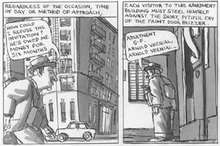Julius Knipl, Real Estate Photographer
| Julius Knipl, Real Estate Photographer | |
|---|---|
| Author(s) | Ben Katchor |
| Current status / schedule | Running |
| Launch date | 1988 |
| Syndicate(s) | Self-syndicated |
| Genre(s) | Humor |

Julius Knipl, Real Estate Photographer is a weekly comic strip written and drawn by Ben Katchor since 1988. It is published in The Jewish Daily Forward and various alternative weekly newspapers.
Katchor embodies his love of the fading small-business community of New York City in the title character, a small businessman who wanders the streets taking pictures and being sidetracked into surreal escapades. Strips often depict Knipl's chance encounters with obscure, marginal businesses (e.g. a company that distributes newspaper weights to newsstands), eccentric hobbyists, and enigmatic details of the urban landscape. There is rarely continuity between the strips, and Knipl is the only recurring character.
A collection of Julius Knipl strips was published in 1991 by Penguin Books (as a RAW One-Shot) as Cheap Novelties: The Pleasures of Urban Decay. Another collection was published in 1996 by Little, Brown and Company under the title Julius Knipl, Real Estate Photographer: Stories. Pantheon Books published a third volume of strips, The Beauty Supply District, in 2000. Each book includes one long story in addition to the self-contained weekly strips. Translated collections of the strip in French and Japanese have also been released.
NPR's Weekend Edition Saturday ran audio versions of several Julius Knipl stories in 1995 and 1996, narrated Katchor and starring Jerry Stiller in the title role.
The word knipl means roughly "nest egg" in Yiddish.[1]
Publication
In 1988 publisher Russ Smith approached Raw co-editor Art Spiegelman about comic strips for the weekly alternative newspaper New York Press. Spiegelman recommended Katchor, whom he had published in Raw. Katchor has since produced the strip weekly, and it has been carried by other alternative weeklies as well, such as The Forward and The Village Voice.[2]
Strips from the series have appeared in the collections Cheap Novelties: The Pleasures of Urban Decay (1991), Julius Knipl, Real Estate Photographer: Stories (1996), Julius Knipl, Real Estate Photographer: The Beauty Supply (2000).[2]
Style and analysis
Katchor draws the strip in a loose, sketchy pen-and-ink style overlaid with a gray watercolor wash. The backgrounds are detailed and drawn from a wide variety of shifting perspectives. A typical strip is made up of eight or nine panels captioned with crooked, hand-lettered boxes. The captions and drawings often follow independent narrative threads, sometimes with ironic effects, with the captions contradicting or reinforcing the visuals.[3]
The dreamlike strip displays a nostalgic tone for New York City, and its Jewish heritage in particular. The strip's city is populated with small businesses that had never existed and that are often implausible, but remiscent of a New York in the days of large numbers of immigrants before the dominance of large corporate chains.[3]
References
- ↑ Chabon, Michael. Introduction to Julius Knipl, Real Estate Photographer Archived 2006-10-20 at the Wayback Machine., Ben Katchor (Little Brown, 1996).
- 1 2 Aubrey 2012, p. 429.
- 1 2 Aubrey 2012, p. 431.
Works cited
- Aubrey, Stephen (2012). "Julius Knipl, Real Estate Photographer". In Beaty, Bart; Weiner, Stephen. Critical Survey of Graphic Novels: Independents and Underground Classics. Salem Press. pp. 429–432. ISBN 978-1-58765-950-8.